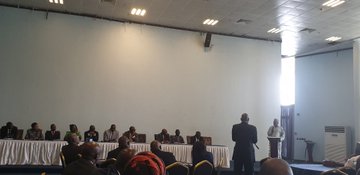SPACES FOR CHANGE joined a broad spectrum of stakeholders drawn from the financial and non-financial sectors of the Nigerian economy at the 2nd Round Mutual Evaluation assessment workshop organized by the Nigerian Financial Intelligence Unit (NFIU) on July 9 – 11, 2019, in Abuja, Nigeria. Convened as part of the final preparation for the Financial Action Task Force’s (FATF’s) Mutual Evaluation exercise and onsite visit scheduled for September to October 2019, the workshop afforded an opportunity for stakeholders to collectively review Nigeria’s submissions to the awaited assessors and reconcile gaps.
FATF’s styled regional body, the Intergovernmental Group Against Money Laundering (GIABA), will conduct the second round of evaluation of Nigeria’s mechanisms and systems for anti-money laundering and countering financing of terrorism (AML/CFT). The assessment will be based on the new methodology for assessing technical compliance with the FATF Recommendations and the effectiveness of AML/CFT systems. The technical compliance component assesses the availability of necessary laws, regulations or other required measures for combating money laundering and terrorist financing in the country, and whether the supporting institutional frameworks for implementation are in place. The effectiveness component will assess whether the AML/CFT systems are working, and the extent to which the country is achieving the defined set of outcomes.
Mr. Modibbo, NFIU director’s opening remarks deplored the operation of shell companies, also known as ‘briefcase companies’ and the implications they pose for the fight against corruption. ’All briefcase companies will be shut down. All shell NGOs will be shut down. Nigerian Financial Intelligence Unit (NFIU) will soon issue ‘Shell Company Guidelines’ aimed at exterminating fake companies often used to launder money and finance terrorism’, the NFIU Director stated. He also shed light on the new guidelines NFIU has developed to ensure local government autonomy, in the bid to extricate the third tier of government from the firm grip of state governments. The issue of local government autonomy has constitutional flavor requiring the National Assembly to adjust the grundnorm to operationalize this proposal. NFIU director argues that although the financial intelligence agency cannot compel the National Assembly to adjust the legal framework, it cannot afford to wait for them (constitutional amendment). Because of the executive-legislative tension underlying this move, industry watchers are watching with bated breath to see how this pans out in reality.
Dr Abdulahi Shehu, Former Director-General of GIABA, talked about 20 important elements of an effective AML/CFT system. Among other things, a country ready for AML/CTF assessment must understand the FATF Recommendations; understand the methodology to be used for the assessment and have had in place autonomous and independent law enforcement agencies.
The second day of the workshop featured breakout sessions enabling stakeholders from diverse sectors of the economy to collectively brainstorm and address sector-specific AML/CFT concerns. SPACES FOR CHANGE participated in the syndicate group for non-profit organizations and non-government organizations (NPOs/NGOs.) At this session facilitated by the Special Control Unit on Money Laundering (SCUML), Ministry of Budget and National Planning and the Financial Reporting Council, S4C led the discussions around Nigeria’s compliance with FATF’s Recommendation 8 and Immediate Outcome 10. Together, stakeholders in the group deliberated on the array of questions and the draft submissions regarding the extent Nigeria’s legislative measures, preventive measures, institutional measures and measures relating to international cooperation, are applied using the risk-based approach to ensure proportionate mitigation of identified risks.




